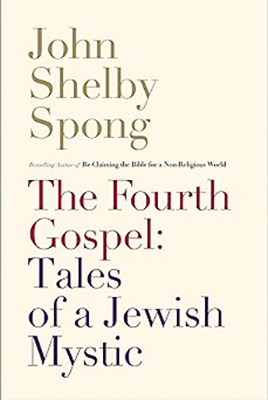The Fourth Gospel
“The Fourth Gospel: Tales of a Jewish Mystic” is a book by John Shelby Spong, a retired American bishop of the Episcopal Church and a prominent liberal theologian. Published in 2013, the book offers a radical reinterpretation of the Gospel of John, challenging traditional Christian interpretations and exploring its mystical and metaphorical dimensions. Here’s a summary:
Main Themes:
Authorship and Context: Spong begins by discussing the authorship and historical context of the Gospel of John, challenging traditional attributions and suggesting that the gospel was written anonymously by a Jewish mystic living in the late 1st century CE. He explores the cultural, religious, and philosophical influences that shaped the gospel’s composition.
Symbolism and Allegory: Spong argues that the Gospel of John should be read as a work of symbolic and allegorical literature, rather than as a straightforward historical account. He examines the gospel’s use of metaphor, symbolism, and narrative imagery, suggesting that it conveys deeper spiritual truths beyond literal interpretation.
Jewish Mysticism: Drawing from his background in biblical scholarship and theology, Spong explores the Jewish mystical traditions that influenced the Gospel of John, including concepts such as the Logos (Word), the Light, and the Bread of Life. He suggests that the gospel’s emphasis on spiritual transformation and divine union reflects themes found in Jewish mystical literature.
Universalism and Inclusivity: Spong highlights the universalistic and inclusive themes present in the Gospel of John, including Jesus’s teachings on love, compassion, and the unity of all humanity. He argues that the gospel challenges exclusivist and hierarchical interpretations of Christianity, advocating for a more inclusive and compassionate expression of faith.
Key Concepts:
– Deconstruction of Traditional Beliefs: Spong deconstructs traditional Christian beliefs about the Gospel of John, including its authorship, historical accuracy, and theological interpretations. He challenges readers to reexamine their assumptions and engage critically with the text.
– Interfaith Dialogue: Throughout the book, Spong engages in dialogue with other religious traditions, particularly Judaism and mysticism. He explores points of convergence and divergence between Christianity and other spiritual paths, emphasizing the importance of interfaith understanding and cooperation.
– Ethical Imperatives: Spong emphasizes the ethical imperatives embedded within the Gospel of John, including the call to love one another, seek justice, and cultivate a deeper spiritual awareness. He encourages readers to embody these values in their lives and relationships.
Legacy:
“The Fourth Gospel: Tales of a Jewish Mystic” has sparked debate and discussion within both religious and scholarly circles. Spong’s reinterpretation of the Gospel of John offers a fresh perspective on familiar biblical texts and challenges readers to engage with the gospel’s mystical and metaphorical dimensions. While controversial, the book has contributed to ongoing conversations about the nature of scripture, the evolution of Christian theology, and the significance of mystical experience in religious life.

